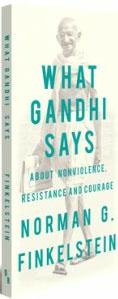 Mohandas Gandhi ‘fostered a death cult’ in which courage, not nonviolence, was the supreme virtue, headed an authoritarian movement in which ‘to doubt Gandhi was to doubt God’, and ‘had a party line, not just on sexual abstinence and vegetarianism, but also on “idle jokes” (opposed), “innocent pleasantries” (perhaps)... and pencils and fountain pens (opposed).’
Mohandas Gandhi ‘fostered a death cult’ in which courage, not nonviolence, was the supreme virtue, headed an authoritarian movement in which ‘to doubt Gandhi was to doubt God’, and ‘had a party line, not just on sexual abstinence and vegetarianism, but also on “idle jokes” (opposed), “innocent pleasantries” (perhaps)... and pencils and fountain pens (opposed).’
Moreover, though he denounced both property damage and trespass as ‘pure violence’, he was not a pacifist in the conventionally understood sense of the term, supporting the idea of ‘calling on the army and having a handful of men shot’ to stop inter-communal rioting among Indians, and backing the deployment of Indian troops after partition to prevent Kashmir’s secession.
Thus writes Norman Finkelstein after a close reading of roughly half of the one hundred 500-page volumes of Gandhi’s Collected Works, though much of this information will come as no surprise to readers who attended the Gandhi workshop at PN Summer Camp 2010!
This book is dedicated to the Occupy movement, and Finkelstein writes that the book is ‘not just, or even primarily, an academic exercise’, noting that ‘Gandhi extracted valuable practical insights into the nature of politics, which it would be imprudent to ignore.’
These insights are probably more clearly expressed in Finkelstein’s 2008 essay ‘Resolving the Israel-Palestine Conflict: What we can learn from Gandhi’. Nonetheless, this short booklet provides a compelling and very worthwhile corrective to the popular picture of Gandhi as a ‘saintly, otherworldly eccentric who would not hurt a fly, and looked as if he could not even if he were so inclined.’

